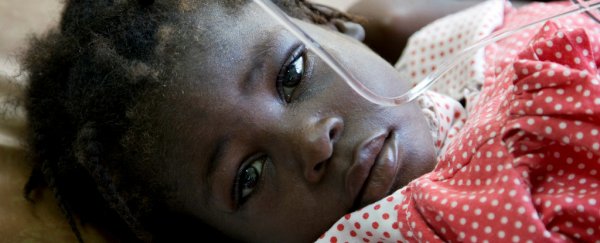The United Nations (UN) has finally acknowledged that it played a role in the cholera outbreak in Haiti that began nearly six years ago, and has killed thousands of people, and infected almost 800,000.
The Secretary General of the UN, Ban Ki-moon, admitted for the first time last week that the organisation was involved in starting the outbreak, and "needs to do much more" to fix the problem.
But a confidential internal report obtained by The New York Times took things one step further, concluding that the epidemic "would not have broken out but for the actions of the United Nations".
Cholera is caused by the bacteria Vibrio cholerae, which is transferred by human waste. Before 2010, Haiti hadn't had a cholera outbreak in more than 100 years, but in 2010, the disease began appearing along the Meille River.
It just so happens that it was shortly after a group of 454 UN peacekeepers had moved into a nearby base, fresh from a mission in Nepal, which was in the middle of a cholera outbreak at the time.
The base's waste flows into parts of the river, and scientists have since argued that this was the only possible cause of the cholera outbreak.
According to official stats, the epidemic has killed at least 10,000 people, but some researchers say the number could be much higher.
The UN has never accepted any level of responsibility until now, and have maintained they're immune from any legal action brought against them relating to the outbreak.
Unsatisfied with this response, one of the UN's experts, or 'special rapporteurs', Philip Alston from New York University, wrote a 19-page report on the UN's role in the outbreak.
He submitted it to Ki-moon on August 8, and the UN now has until the end of the week to respond. Ki-moon has now said the organisation "played a role" in the outbreak, but they need to decide whether to accept the reports' claims that they're entirely to blame.
The deputy spokesman for the secretary general, Farhan Haq, told The New York Times in an email this week:
"Over the past year, the UN has become convinced that it needs to do much more regarding its own involvement in the initial outbreak and the suffering of those affected by cholera … a new response will be presented publicly within the next two months, once it has been fully elaborated, agreed with the Haitian authorities and discussed with member states."
This isn't the first criticism against the UN's work in Haiti. According to a study in PLOS Medicine in January, the UN could have reduced the probability of an outbreak by 91 percent if they had administered chemoprophylaxis treatments, which would have cost less than $1 per peacekeeper.
The worst part of all of this is that the cholera outbreak in Haiti still isn't under control, and the death toll continues to rise.
Let's hope this acceptance of responsibility is the first step towards the UN getting the situation under control.
